Reverse Osmosis (RO) technology has been around for decades. There are a variety of reasons that one might opt to invest in an RO system for their home or business. In this article I want to specifically explain how RO technology works and how you might use it in your daily life.
Key Takeaways:
- RO is a well established process that creates high quality water.
- RO technology is used by manufactures, commercial businesses, the beverage industry, and in our homes.
- RO systems vary. If you are interested in utilizing reverse osmosis to treat your water, it is recommended that you have a professional water test performed to evaluate what what type of system would best fit your needs.
Reverse osmosis (RO) is a technology that is used for water treatment. RO systems force water across a semipermeable membrane. There are many impurities and contaminants that are unable to pass across the membrane and are flushed to a drain. The water that does move across the membrane is typically a very high quality water that can be used in a variety of ways.
The chart above illustrates how the semipermeable membrane filters the contaminated tap water
RO technology is used for many commercial and industrial purposes, but you may be most familiar with the terminology as a result of its popularity for drinking water applications. Many bottled water brands utilize reverse osmosis to treat the water that they bottle. Additionally, residential RO systems are very popular for treating water in the home.
Residential RO systems are an excellent choice for people who would like to have high quality water available throughout the day for drinking, making ice, cooking, and rinsing fruits and vegetables. Aside from the many contaminants that are addressed by the RO membrane (sodium, fluoride, heavy metals, etc), the home RO systems are often equipped with a secondary technology, activated carbon filtration, that can address a host of other contaminants. All reputable manufacturers of these systems can provide you with a Performance Data Sheet (PDS) that will tell you exactly what contaminants the system is able to address.
Reverse Osmosis systems differ from manufacturer to manufacturer. If you are interested in exploring the possibility of having a drinking water system installed, the first step is to have your water tested. A water specialist can advise you on the best type of drinking water system for your home. You may find that a reverse osmosis system is right for you.








